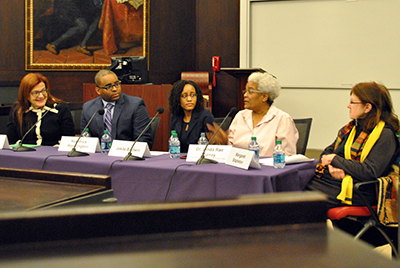
“Faith is taking the first step even when you don’t see the whole staircase.”
On Thursday, medical and law professionals sat down for a discussion inspired by these famous words of Martin Luther King, Jr. The panel, part of a series of events Northwestern University organized to commemorate King’s legacy, addressed institutional mistrust and how healthcare and legal systems can connect with patients and clients from disenfranchised communities to give them the services they need – even when the staircase isn’t visible.
Jakita Baldwin, a second-year medical student at Feinberg and moderator of the panel, opened up the conversation by citing statistics from a 2014 report by the Black Youth Project at the University of Chicago. According to the report, only a quarter of black youth said that the American legal system treats all racial groups equally. Just 60.2 percent of black youth said they felt like full and equal citizens.
“These facts are troubling, but to be quite frank, I’m actually surprised that as many youths have that level of confidence in the system based on the injustices I’ve seen with my clients over the years,” said panelist Kendrick Washington, an alumnus of Northwestern University School of Law.
Baldwin asked the panelists how professionals working in medicine and law can change a system that perpetuates this distrust.
“This is a structural problem, not simply a problem of one marginalized community having trouble,” said panelist Linda Rae Murray, former chief medical officer of the Cook Country Department of Public Health. “We have an obligation, especially in our fields where we’re responsible for people’s lives, to stand up and speak out for what we believe in.”
Though Martin Luther King, Jr. Day was officially Monday, January 19, the Northwestern community is celebrating the civil rights leader’s achievements during a week and a half of events. In addition to the panel, Northwestern’s DREAM committee and Black Law Students Association organized Chicago campus programming including a viewing of the movie Selma, a drama based on King’s 1965 voting rights marches, and a presentation of Let Hope Rise, a production by theater company Collaboraction that examines questions about segregation, poverty and Chicago’s history of violent crime.
“The DREAM Committee’s goal when planning these events was to honor the legacy of Dr. King by holding programs that we hoped would bring awareness to the values he stood for,” said Michael Mbagwu, a fourth-year medical student and member of the DREAM committee.
“It’s important for the Northwestern community to engage in activities commemorating Martin Luther King, Jr.’s legacy in order to continue its long history of embracing diversity as an institution,” he said. “It was great opportunity for the medicine, law and business schools to work together for a common goal, and we hope to continue our work in future years.”
This Saturday, students, staff and faculty will continue to honor King’s life and work by participating in a day of service. On Monday, a University-wide campus observance will feature keynote speaker Michelle Alexander – a celebrated civil rights attorney, advocate and legal scholar – as well as music and performances from Northwestern student groups.
More details on the Northwestern University Martin Luther King, Jr. events – all free and open to the public – are available here.






